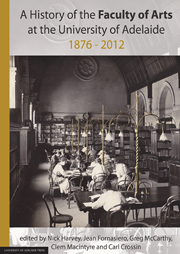Book contents
- Frontmatter
- Contents
- List of Contributors
- 1 The Faculty of Humanities and Social Sciences and the BA Degree at the University of Adelaide since 1876
- 2 Webs of Significance: an Ethnographer's Account of Anthropology at the University of Adelaide from 1973 to 2011
- 3 The History of the Centre for Asian Studies at the University of Adelaide
- 4 Classics at the University of Adelaide (1874–2012)
- 5 English and Creative Writing: ‘the abode of … literature; the home of poetry and fiction’
- 6 A Tale of Resilience: the History of Modern European Languages at the University of Adelaide
- 7 Geography, Environment and Population at the University of Adelaide, 1904–2012
- 8 Gender Studies and Social Analysis
- 9 History
- 10 The History of Aboriginal Languages and Linguistics at the University of Adelaide
- 11 The Digital, Participatory and International Turn: Media at the University of Adelaide
- 12 Musical fusions
- 13 Philosophy at the University of Adelaide
- 14 Politics at the University of Adelaide
- Appendices
13 - Philosophy at the University of Adelaide
Published online by Cambridge University Press: 05 June 2013
- Frontmatter
- Contents
- List of Contributors
- 1 The Faculty of Humanities and Social Sciences and the BA Degree at the University of Adelaide since 1876
- 2 Webs of Significance: an Ethnographer's Account of Anthropology at the University of Adelaide from 1973 to 2011
- 3 The History of the Centre for Asian Studies at the University of Adelaide
- 4 Classics at the University of Adelaide (1874–2012)
- 5 English and Creative Writing: ‘the abode of … literature; the home of poetry and fiction’
- 6 A Tale of Resilience: the History of Modern European Languages at the University of Adelaide
- 7 Geography, Environment and Population at the University of Adelaide, 1904–2012
- 8 Gender Studies and Social Analysis
- 9 History
- 10 The History of Aboriginal Languages and Linguistics at the University of Adelaide
- 11 The Digital, Participatory and International Turn: Media at the University of Adelaide
- 12 Musical fusions
- 13 Philosophy at the University of Adelaide
- 14 Politics at the University of Adelaide
- Appendices
Summary
The University of Adelaide was established in 1874. It is the third oldest Australian university. An inaugural grant of £20,000 was provided by Walter Watson Hughes for two foundation professorships: in English Language and Literature and Mental and Moral Philosophy, and in Classics and Comparative Philology and Literature.
The first occupant of the philosophy chair was the Rev. John Davidson. He was not a university graduate, but his ministry of the Church of Scotland entailed a considerable education. He seems to have taught mostly logic, presumably Aristotelian logic. His successor was Edward Vaughn Boulger, philosopher, literary theorist and classicist, who had a strong academic background from Trinity College, Dublin before coming to Adelaide. Boulger is notable for having conflicted with the University over tenure of appointment, which the University did not award at the time. He was forced to resign in 1894 due to intoxication.
The first real philosopher to be appointed was William Mitchell, who arrived from Scotland in early 1895. He had already published several papers in Mind, including one as an undergraduate. His main work was Structure and Growth of the Mind (1907). On the strength of this, he was invited to give two series of Gifford Lectures at the University of Aberdeen (1924 and 1926), which were published as The Place of Minds in the World (1933). Mitchell gave up the chair in 1923. However, he was (unpaid) Vice-Chancellor 1916–1942, where he was the principal driving force for a major expansion of courses and buildings, and the Teachers Training College.
- Type
- Chapter
- Information
- A History of the Faculty of Arts at the University of Adelaide1876-2012, pp. 351 - 358Publisher: The University of Adelaide PressPrint publication year: 2012



